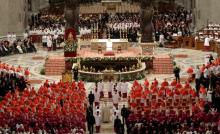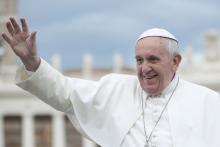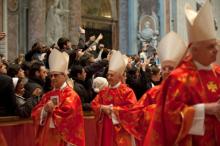consistory

The fact that none of the five are Italian, and none hold Vatican positions, underscores Francis' conviction that the Church is a global institution that should become increasingly less Italian-centric.

Pope Francis reinforced his radical reshaping of the Catholic Church by naming 20 new cardinals from countries as far afield as Ethiopia, Tonga, Thailand, and Panama.
The clerics – who come from 18 different countries – include 15 who are eligible to vote for the pope’s successor in a future conclave, and five retired bishops and archbishops “distinguished for their pastoral charity” who are over age 80 and ineligible to select the next pontiff.
Dissatisfied with the slow pace of change in Rome, Francis’ appointments reflect his desire for “pastors on the front line of difficult situations,” one Vatican observer said, who can bring a new perspective from the often overlooked outposts of global Christianity.
The Vatican’s chief spokesman, the Rev. Federico Lombardi, said the choices showed the pope’s most important criteria was “universality,” and indicated he was not “chained to tradition” as he moves the balance of power at the highest levels of the church closer to the developing world.
It is the first time ever that cardinals have been selected from Tonga, Myanmar, and Cape Verde to become “princes of the church.” There are only five Europeans included among the 15 new electors – two from Italy and three others from Corsica, Spain, and Portugal. The United States was shut out for the second time in a row.

In naming his first batch of new cardinals on Sunday, Pope Francis made some surprising choices that largely confirmed the characteristics he wants in the Catholic Church he leads: a greater focus on the poor, a bigger voice for the Global South and a reduced emphasis on the traditional hierarchical perks.
True to form, Francis wrote each of the new cardinals and stressed that the new title “does not imply promotion.” He asked them to refrain “from any expression of worldliness or from any form of celebration contrary to the evangelical spirit of austerity, sobriety and poverty.”
Some had expected Francis to leave his mark by pushing well beyond the ceiling of 120 cardinals under the age of 80 who are eligible to vote in a conclave.

The Vatican on Monday moved to quash speculation that at least two women would be among the cardinals that Pope Francis will name in February, saying such a move was “not a realistic possibility.”
Over the weekend, Irish media reported that Francis could name Linda Hogan and Mary McAleese as cardinals. Both are associated with Trinity College in Dublin: Hogan as a professor of ecumenism, and McAleese, the former president of Ireland, as a former professor.
Some Italian media that carried the story speculated that Cecile Kyenge, the Congo-born Italian minister of integration, could be a candidate as well. Kyenge is a devout Catholic and a graduate of the Catholic University of the Sacred Heart in Milan.